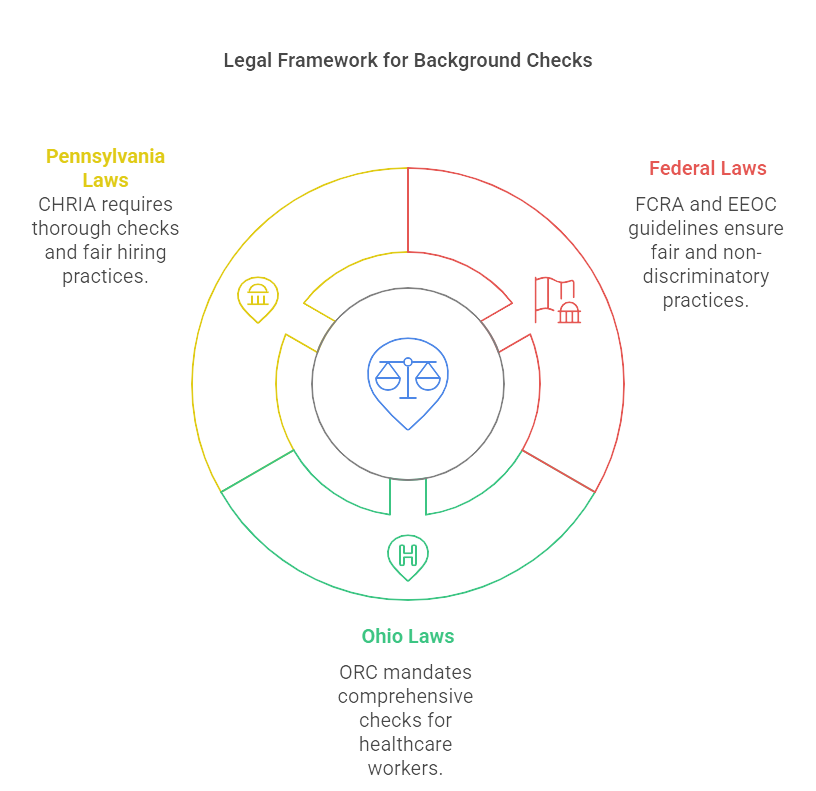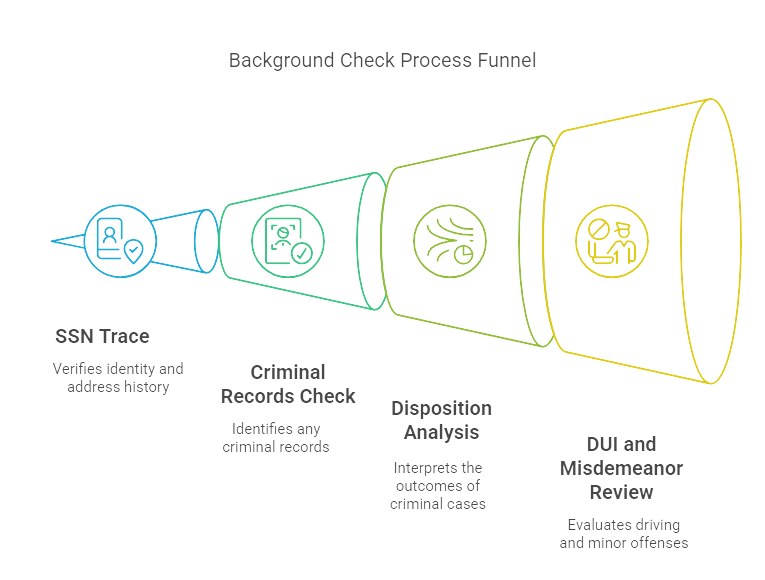The landscape of employment is dotted with hurdles, and criminal background checks represent one of the most critical. For Certified Nursing Assistants (CNAs), this process can be especially stringent due to the sensitive nature of their work. Whether you are a business owner, recruiter, or job seeker in the healthcare industry, understanding the nuances of CNA criminal background checks and how they impact employment is essential.
In this guide, we will cover everything from the basics of background checks to specific state laws and common concerns. By the end of this article, you will be well-equipped to navigate the complexities of criminal background checks in various industries, especially concerning CNAs.
Key Takeaways
- Conducting criminal background checks for CNAs is essential due to their direct, unsupervised contact with vulnerable populations and access to sensitive healthcare information.
- Federal laws like the FCRA and EEOC guidelines, along with state-specific regulations, govern the background check process to ensure compliance and non-discriminatory practices.
- A standard CNA background check involves reviewing national criminal databases, state and county records, sex offender registries, and identity verification, often including additional screenings like drug tests and health checks.
- Employers and job seekers must prepare thoroughly for criminal background checks, with employers focusing on compliance and transparency and job seekers addressing past offenses proactively.
- Understanding the intricacies of criminal background checks in the healthcare sector helps ensure a safe, secure, and trustworthy environment for both employees and patients.
Introduction
Hiring the right person for a job is a critical task, and in the healthcare sector, the stakes are even higher. For Certified Nursing Assistants (CNAs), who work closely with vulnerable populations, criminal background checks are more than just a formality—they're a necessity. This guide dives into the specifics of CNA criminal background checks, offering valuable insights for everyone involved in the hiring process, from business owners and HR professionals to job seekers in the healthcare industry.
So why are criminal background checks so significant, especially for CNAs? The answer lies in the nature of their work. CNAs often have direct, unsupervised contact with patients and access to sensitive healthcare information. Therefore, ensuring these individuals have clean backgrounds is essential for maintaining trust and safety in healthcare environments.
In this article, we'll unpack the nuances of criminal background checks. We'll cover key legal requirements, elaborate on procedures specific to CNAs, and provide practical tips for both employers and job seekers. Whether you're responsible for hiring or you’re the one seeking employment, understanding these checks is essential for navigating the complexities of the healthcare job market.

What are Criminal Background Checks?
Criminal background checks are thorough investigations into an individual's criminal history. These checks typically involve searching various databases and records, including local, state, and federal criminal databases, sex offender registries, and sometimes even international records.
Employers conduct criminal background checks to ensure the safety and security of their employees, clients, and overall business operations. This is especially crucial in sensitive fields like healthcare, where CNAs (Certified Nursing Assistants) interact daily with vulnerable populations such as the elderly, sick, and disabled. A clean background check can help ensure that a candidate is trustworthy and poses no risk to the patient’s safety.
Numerous industries mandate criminal background checks due to regulatory requirements and the nature of the job. This includes healthcare roles like CNAs, caregivers, and nurses; education positions such as teachers and school staff; roles within financial services; and security-sensitive positions within government agencies. Even beyond these fields, many employers require background checks to maintain a safe and compliant workplace.
EXPERT INSIGHT: As HR practitioners, we like to speak of staff as our strongest resource—but evidence of that trust comes when we're presented with an individual's history face to face. In healthcare, especially as it relates to CNAs, criminal background checks are prudent precautions—but they're entry points to human nuance as well. I have screened applicants who bear burdens of missteps of years gone by with deep remorse, wanting to rebuild not just their career but their integrity as well. Our role—and privilege—is to safeguard safety and still be receptive to glimpses of transformation and rehabilitation. Because at its essence, HR isn't about regulation rules; it's about trusting in accountability and second chances. - Charm Paz, CHRP
Legal Framework Surrounding Background Checks
Navigating the legal web surrounding criminal background checks can be daunting, yet it's essential, especially in the healthcare industry. Let's break down the key federal and state laws you need to know.
Federal Laws
When it comes to federal regulations, the Fair Credit Reporting Act (FCRA) and guidelines from the Equal Employment Opportunity Commission (EEOC) are your primary references. The FCRA stipulates how employers must handle the background check process. This law mandates that employers must obtain written consent from the job applicant before conducting a background check and must notify the applicant if the information obtained results in an adverse decision, such as not getting hired.
On the other hand, the EEOC provides guidelines to ensure that the use of background checks does not result in discriminatory practices. For instance, the EEOC advises that background check policies should not disproportionately affect specific racial or ethnic groups, and employers should consider the nature of the crime, the time elapsed, and the nature of the job when making decisions based on criminal records.
State-Specific Laws
In addition to federal laws, each state has its regulations regarding criminal background checks. Here's a quick look at the laws in Ohio and Pennsylvania, two states with distinct requirements.
Ohio Background Check Laws
In Ohio, background checks are regulated by the Ohio Revised Code (ORC), specifically under Section 109.572. For healthcare workers like CNAs, the state mandates a comprehensive background check that includes both state and FBI checks. Ohio's Department of Health and the Board of Nursing have stringent guidelines, making it crucial for employers to stay compliant to avoid legal repercussions.
Pennsylvania Background Check Laws
Pennsylvania follows a similarly rigorous approach, guided by the Pennsylvania State Board of Nursing and Act 34 Criminal History Record Information Act (CHRIA). CNAs in Pennsylvania are subject to both state police checks and FBI fingerprint-based checks. The laws also require that employers review any criminal history to determine if it directly relates to the position's requirements, ensuring that hiring practices remain fair and non-discriminatory.
Understanding and adhering to these legal frameworks is critical. While federal laws provide the broad strokes, state-specific laws fill in the details, making it vital for employers and CNAs alike to stay informed about both. This knowledge equips you to make smart, lawful hiring decisions and to navigate your job search with confidence and clarity.

CNA Criminal Background Checks: Detailed Insights
Requirements for CNAs
When it comes to CNAs, the stakes in the hiring process couldn't be higher. These professionals have access to vulnerable populations, from the elderly in nursing homes to patients in hospitals. Because of the high trust placed in them, criminal background checks for CNAs are among the most stringent. The primary aim is to ensure the safety and well-being of those under their care. Any red flags in a candidate's background can raise concerns about their suitability for this sensitive job.
What CNAs Can Expect
Standard Checks
A standard criminal background check for CNAs typically covers several key areas. Expect a thorough review of:
- National Criminal Databases: A scan through national databases to identify any serious criminal offenses.
- State and County Records: Examination of local criminal records to spot any regional convictions or infractions.
- Sex Offender Registries: Ensuring the candidate does not pose a risk to vulnerable populations.
- Identity Verification: Confirming that the person is who they claim to be, usually through Social Security number traces.
These checks offer a comprehensive view of the candidate's criminal history, ensuring no stone is left unturned.
Additional Checks
Besides the standard background checks, CNAs may also undergo a few other screenings:
- Drug Tests: It's not uncommon for employers to include drug tests as part of the background check process. While these tests aren't typically considered part of the "criminal" background check, they are crucial for healthcare settings to ensure a drug-free work environment.
- Health Screenings: Some employers might require additional health-related checks to ensure the physical capability of CNAs to handle their job responsibilities.
Putting It All Together
For both employers and job seekers, understanding the heightened scrutiny CNAs face can make the difference between a successful hire and a potential oversight. Operating in an environment that demands such high levels of trust and responsibility, it's imperative to embrace the rigorous standards of criminal background checks fully. Whether you're a prospective CNA preparing for these checks or an employer aiming to make informed hiring decisions, knowing what to expect can streamline the entire process.
What to Expect in a Background Check Report
Understanding what shows up in a background check report can help both employers and job seekers navigate the process more effectively. Here’s a breakdown of the key components:
SSN Trace Background Check
An SSN Trace is usually the starting point for any comprehensive background check. It verifies the candidate's Social Security Number (SSN) and provides a history of addresses associated with that SSN. This helps to confirm identity and uncover address history, which is crucial for checking for criminal records in jurisdictions where the candidate has lived. Essentially, the SSN Trace acts as a gateway, ensuring that subsequent checks are thorough and accurate.
Understanding Dispositions
When criminal records are pulled, terms like "disposition" often appear. The disposition indicates the current status or outcome of a criminal case, such as whether it resulted in a conviction, dismissal, or acquittal. For employers and job seekers, it's crucial to understand that a charge doesn't always equal a conviction. Knowing how to interpret these terms can prevent misunderstandings during the hiring process.
DUIs and Misdemeanors
Driving Under the Influence (DUI) convictions and misdemeanors can also feature prominently in background checks. DUIs, in particular, can be highly scrutinized due to the risks they present, especially in healthcare settings. Candidates often wonder, "Do I have to disclose a misdemeanor after 7 years?" The answer depends on state laws and company policies. Some states have "ban the box" laws that limit how far back an employer can consider a candidate's criminal history. Generally, transparency is advisable; failing to disclose information that later surfaces can be more damaging than the offense itself.
Understanding these elements helps demystify the background check process and equips both employers and job seekers with the knowledge to handle it smoothly.

How to Prepare for a Criminal Background Check
For Employers:
Best Practices for Conducting Checks
First off, start with a clear policy outlining why and how background checks are conducted within your organization. Transparency is key. Obtain written consent from candidates before proceeding. Use reliable services for accurate and comprehensive results—this isn't an area where you want to cut corners.
Next, ensure you're compliant with both federal and state regulations. For federal laws, familiarize yourself with the Fair Credit Reporting Act (FCRA) and guidelines from the Equal Employment Opportunity Commission (EEOC). For state-specific laws, consult legal resources to avoid any compliance missteps.
After collecting background check data, make decisions based on job relevance. For example, a past DUI might not be critical for a desk job, but it could be a significant concern for a role requiring the care of vulnerable populations, like a CNA.
Avoiding Red Flags
Make a list of red flags that align with the job requirements. These might include violent offenses, theft, or any crime related to drug abuse, depending on the role. Utilize internal resources that outline common concerns and red flag indicators. Links like common background check questions and red flags in background checks are useful for quick reference.
For Job Seekers:
Self-Preparation
Begin by running your own background check. Various services offer this for a fee, allowing you to see what employers will see. Check for inaccuracies and outdated information that you can dispute if necessary.
Know what's on your record, and be ready to discuss it. Employers appreciate honesty and straightforwardness. Prepare a concise explanation for any offenses, focusing on rehabilitation and the steps you've taken to prevent recurrence.
Handling Past Offenses
When you have past misdemeanors or felonies, prepare to address these proactively during interviews. The goal is to control the narrative, showing that you’ve learned from the past. Bring forward any documentation that shows rehabilitation or community service.
For those specific misdemeanors or felonies, research if they can be expunged from your record. An expungement can make a significant difference in how you're viewed by potential employers.
In closing, regardless of your position—whether hiring or seeking a job—preparation and honesty go a long way. Assemble all necessary documents, understand the legal landscape, and approach this aspect of the employment process with a clear strategy. It’s about ensuring the right fit for both the employer and employee, promoting a safe and trustworthy work environment.
Frequently Asked Questions (FAQ)
Criminal background checks can be problematic, however, especially to employers of health workers and to CNAs. In order to dispel many of the most common myths, we assembled answers to significant questions often raised about making hiring decisions. Whether you're an applicant or an HR member, the following answers were designed to clarify and provide helpful insight.
Can a CNA work with a criminal record?
Yes, but it depends on the nature of the crime, how long ago it occurred, and state-specific regulations. For instance, crimes involving violence, abuse, or theft might pose significant barriers to employment in healthcare settings because of the vulnerable populations CNAs serve. However, some states provide pathways for individuals with certain types of criminal records to petition for exceptions or rehabilitation certificates.
How far back does a criminal background check go?
The time frame for criminal background checks can vary by state. Generally, most background checks cover the past seven years, though certain states and employers may extend this timeframe for serious offenses. It's also crucial to check state-specific laws, as some states restrict reporting of crimes older than seven or ten years unless the position's salary exceeds a certain threshold.
What do employers look for in CNA background checks?
Employers focus on various aspects during a CNA background check, aiming to ensure the safety and integrity of their workplace. They typically look for:
- Felony convictions, particularly those related to abuse, violence, or theft.
- Misdemeanors involving drug use, fraud, or any form of misconduct.
- Consistency of the applicant’s employment history and credentials.
- Any red flags in the individual’s record that could indicate potential risks to patients.
Are drug tests part of the background check process?
While drug tests are not typically part of the criminal background check itself, many healthcare employers require them as a separate screening procedure. This is crucial for CNAs due to the high responsibility of their roles and the necessity to ensure they are not impaired while providing care. Employers might conduct pre-employment drug testing and may also carry out random drug tests periodically during employment.
Conclusion
Navigating the landscape of criminal background checks for CNAs can be a daunting task, but understanding the key elements can make the process much smoother for all parties involved. We've delved into the importance of these checks, particularly due to the sensitive nature of the healthcare environment, and examined specific requirements and best practices.
To summarize, employers must conduct thorough yet fair background checks to ensure the integrity and safety of the workplace. Being familiar with both federal and state-specific laws is crucial to maintain compliance. On the other hand, job seekers, particularly CNAs, should prepare themselves adequately, transparently addressing any past offenses during their job search.
In essence, the goal of criminal background checks is not just about compliance, but about fostering a safe and trustful environment for both employees and those they care for. For employers, it’s about making informed hiring decisions while upholding fairness and integrity. For job seekers, it’s about approaching the process with honesty and preparedness.
By adhering to these practices and understanding the nuances of the procedure, both employers and candidates can pave the way for a more secure and trustworthy workplace.
Still have questions?
Get in touch with our team today for a personalized demo and discover how our tailored volume pricing and packages can drive results for your business!
How useful was this page?*
Note: your comments are anonymous. We use them to improve the website. Do not include any personal details.
Visit our FCRA Compliance Tool or leave a message here if you need a response.
From the blog Explore the GCheck Content Hub

Pharmaceutical Industry Hiring Compliance: A 2026 Guide to Risk-Intelligent Screening
20 Jan, 2026 • 19 min read
How to Background Check Substitute Teachers: 2026 Strategic Framework
19 Jan, 2026 • 18 min read
California Casino Employee Background Check Requirements: 2026 Compliance Guide
19 Jan, 2026 • 22 min readThe information provided in this article is for general informational and educational purposes only and should not be construed as legal advice or a substitute for consultation with qualified legal counsel. While we strive to ensure accuracy, employment screening laws and regulations—including but not limited to the Fair Credit Reporting Act (FCRA), Equal Employment Opportunity Commission (EEOC) guidelines, state and local ban-the-box laws, industry-specific requirements, and other applicable federal, state, and local statutes—are subject to frequent changes, varying interpretations, and jurisdiction-specific applications that may affect their implementation in your organization. Employers and screening decision-makers are solely responsible for ensuring their background check policies, procedures, and practices comply with all applicable laws and regulations relevant to their specific industry, location, and circumstances. We strongly recommend consulting with qualified employment law attorneys and compliance professionals before making hiring, tenant screening, or other decisions based on background check information.


